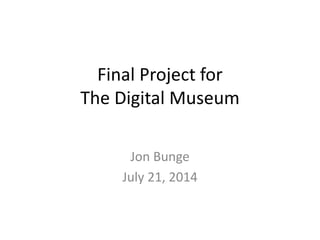
Digital museum final project 7 2014
- 1. Final Project for The Digital Museum Jon Bunge July 21, 2014
- 2. Proposal for The Metropolitan Museum of Art’s Sierra Leone Youth Art Project
- 3. My Original Questions: • Given the very unequal distribution of cultural riches in the world, how could they be better shared? • How could the Internet and digital media be used to share the cultural resources of a great museum with people of impoverished countries, who have much less access to such resources?
- 4. My Client: The Met • Because their encyclopedic collection would appeal to people of various cultures • I wanted to be careful not to “export” only Western culture (the main focus of some U.S. museums)
- 5. My Target Country: Sierra Leone Why Sierra Leone? • A mentee of mine, Mohamed Bah, is from there • Small, impoverished nation in West Africa, population about six million • One of the poorest countries in the world • One of the lowest literary rates in Africa
- 6. My Original Idea • Educational videos produced by the Met about art objects from the Met’s collection that could be viewed online • The Met staff would give background and explanation of various objects on the videos • Videos would be translated into the main native language of Sierra Leone (Creole) or be subtitled • Videos could later be subtitled in many languages to be used not only in Sierra Leone—with the idea that the Met is a global institution and in keeping with “One Met. Many Worlds.” • For older children, videos could be a curriculum tool in schools • Adults could learn about art and have their world expanded
- 7. What I learned from Mohamed • My idea isn’t a good one because it requires Internet access • Less than 1% of the population of Sierra Leone is online (according to one figure on the net) • Electricity outages are common, so Internet access is inconsistent • Subtitles won’t work well – only 43% are literate – and Creole is not really a written language • No free public education in Sierra Leone, so only an estimated 25% of kids are in school (and thus wouldn’t see videos) • Mohamed himself didn’t start school until he was nine • Main takeaway: I didn’t realize how big the “digital divide” still was.
- 8. New Proposal (in conversation with David) The Met would: • Collaborate with a NGO in Sierra Leone which focuses on youth and education (the Met would not run the program itself) • Solicit donations of computer tablets and solar chargers (the latter to address the electricity issue) • Load the tablets with images of masterpieces of world art (not just Western) from the Met’s collection • Find someone fluent in Creole, perhaps a volunteer, to translate background information and discussion questions about the art objects • Load translated information onto tablets
- 9. Example of Tablet Screen
- 10. Proposal (continued) • An instructor from the NGO would run classes for children • Instructor will lead discussion about works of art on the tablet (to address lack of art education in school) • Children will then be taught how to take photos on the tablet • Photo activities could be based on images studied from the tablets • Children would then share their best photos on Facebook • Facebook pages would be maintained in Creole (for audience in Sierra Leone and West Africa) and English (for audience in the U.S. and other English-speaking countries)
- 11. Facebook page (Creole version)
- 12. Proposal (final points) • The Met would maintain a blog about the project on its website, with a link to both versions of the Facebook page and other social media • With some funding and in-kind donations, exhibits of the children’s artwork would be mounted in both Sierra Leone and New York • The children would help with prepping the work for the shows (such as matting and framing), thus learning more skills • The shows would help to publicize and raise money for the project • Some of the proceeds from any sales at the shows would go to the children and their families • With increased visibility and funding, the project expands to serve more children
- 13. Thank you so much for listening!